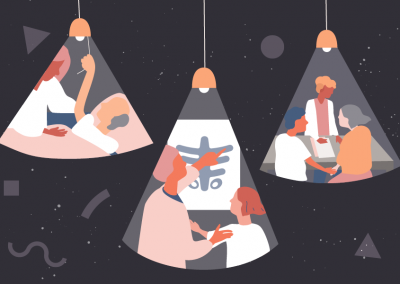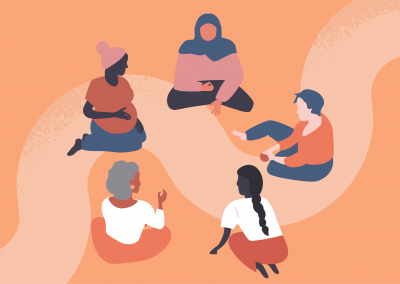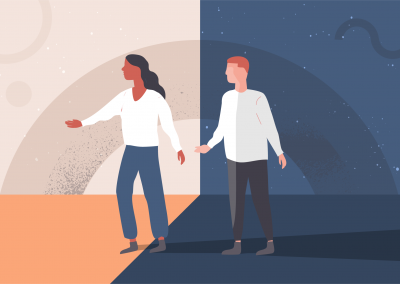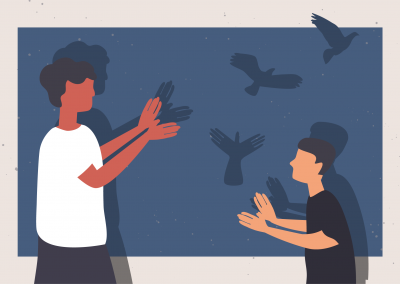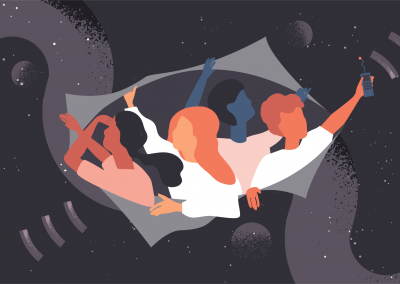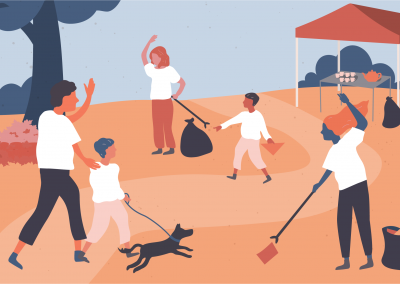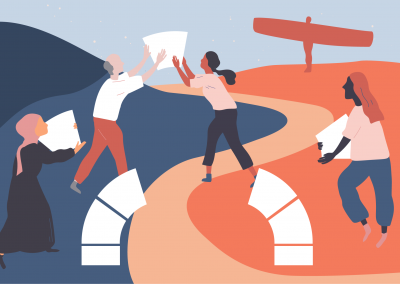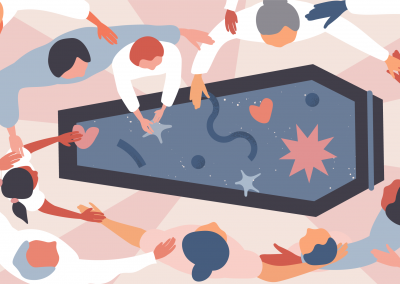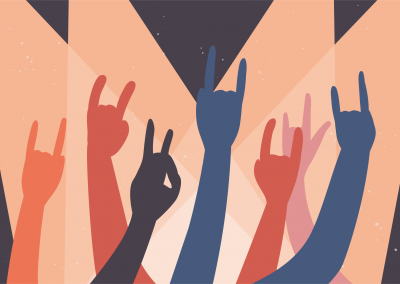Three Community Groups
Tackling local issues by creating spaces and excuses to connect
Case Maker –> Stories –> Three Community Groups
Relational work happens at all scales. Here are the stories of three grassroots community groups.
For these three local groups, relationships are both the aim and the mechanism of their work. Good relationships alleviate the issues they set out to address.
In all three, the structures are quite loose. There is no pre-determined agenda. They don’t try to fix and control the outcomes. From a certain angle, this might look like a flaw. What’s striking, though, is how intentional the design of these community groups is. All three believe in the intrinsic value of creating spaces and reasons for people to gather and form relationships. Likewise they all describe the detrimental effect of over-structuring the process. Doing so can close down the relational space at the heart of their work.
There is a paradox in these models that is easy to miss. They are intentionally non-intentional and deliberately unstructured. Their agenda is to create spaces without an agenda.
Trust is at the heart of this work: trust that bringing local people together in a carefully created space will lead to good outcomes; trust that people will collectively define the goals that matter to them. Relational work here is open and emergent.
Yet all three groups also feel anxiety about the fact that the systems around them expect more structured approaches and neater evidence of impact. They are pulled between their desire to create powerful, relational spaces and their need to tell a story that outside bodies can easily accept and understand.
Moston Social Clean-Ups
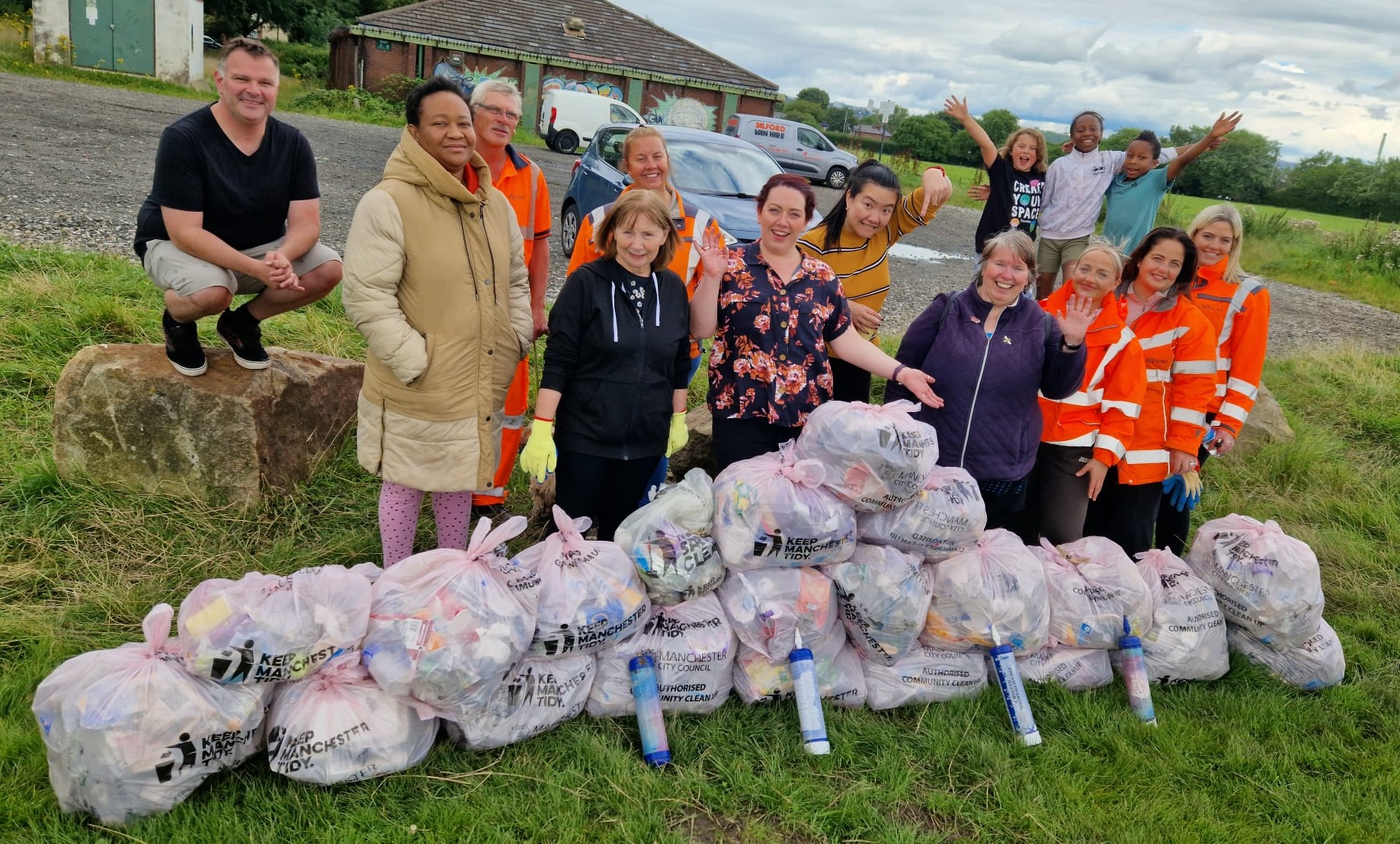
Photo credit: Joe Hartley
‘When you’re out doing something good, people literally say: Nobody ever does anything good in this area,’ says Joe Hartley, who founded Moston Social Clean-Ups with his partner, Shau Mei, and nine-year-old daughter, Freya. ‘And we’ll be like: Well, we’re trying. Fancy a brew?’
Joe’s family decided to start a group to bring people together and promote the integration of different local communities. They focused on litter picking, Joe says, because it’s ‘one of the easiest things to set up and get rolling.’
They advertise the clean-ups on Facebook and meet regularly in Moston Peace Gardens, a small green space just off a local high street. ‘Shau Mei and I will set up the gazebo and a little table,’ Joe says, ‘and Freya sorts out the brews and cake.’
‘We’ll lay out all the bags and litter pickers and people will pop in because it looks like something’s going on. People can’t resist those litter pickers. They’ll be like You mean I get to grab things with a grabber? I’ve always wanted to have a go with one of those.’
Yet despite the allure of the litter pickers it can be difficult to build trust. People are used to being sold to, surveyed or preached at in public spaces; they can be wary of interacting with strangers. Often if someone stops them, it’s because they want something.
‘There’s a lady who always walks by with a pram,’ Joe says. ‘You could tell she was interested but she wouldn’t stop. One day she sat on a bench nearby and we went over and offered her a brew. Next time she was like Hiya, you okay? and slowly we could see her opening up.’
‘We’ve got no agenda,’ Joe says, ‘and that’s been fantastic. We have a casual objective to clean up some green spaces, but beyond that we set up a table, have a cup of tea, and generally just try and create good vibes.’
Joe mentions the suspicion that some members of the community feel towards top-down projects. ‘Being grassroots has been key to gaining trust,’ he says. ‘There’s a bit of distrust when it comes to larger organisations, even when they do good work.’ Joe and Shau Mei invite other grassroots groups to come to the clean-ups so they can form connections and amplify one another’s work.
Although the litter picks are highly sociable, Joe considers himself an introvert – a mode he’s found surprisingly well suited to this kind of relational work. ‘By not wanting to be at the centre,’ he says, ‘you leave the space open.’
The litter picking is meaningful, but it is also incidental. ‘Our idea isn’t to end litter or make the place 100% tidy,’ says Joe. Rather the aim is to build local relationships, bridge divides, counter negative rhetoric, and seed positivity in people’s minds.
‘Our idea isn’t to end litter or make the place 100% tidy,’ says Joe. Rather the aim is to build local relationships, bridge divides, counter negative rhetoric, and seed positivity in people’s minds.
‘We’ve got no plan’, Joe says. ‘We’ve got no one to feedback to. We’re stopping for the winter, but next year “we’ll be out regularly again. Areas like ours really benefit from that consistency.’
Jean’s Bothy, Hellensburgh
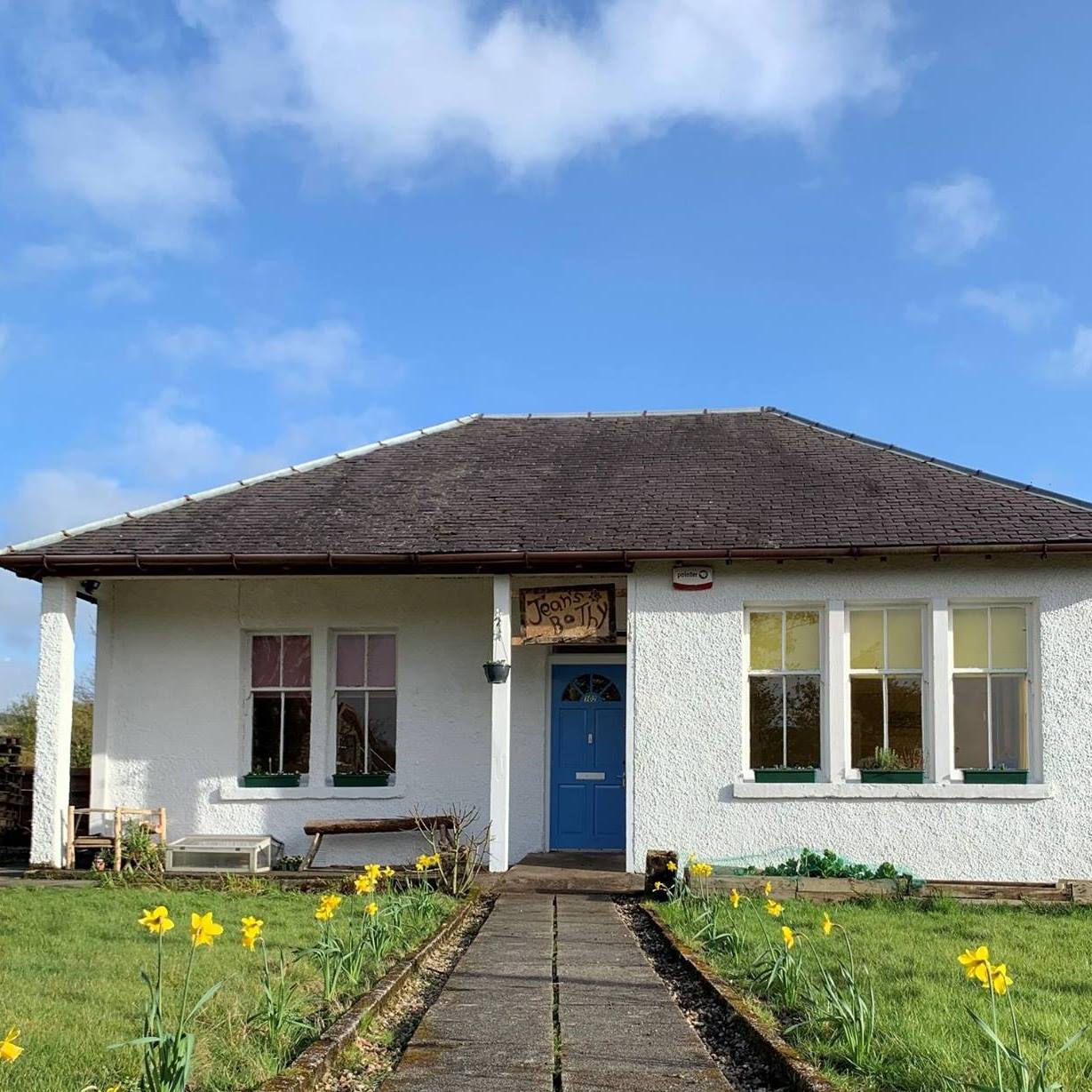
Photo credit: Jean’s Bothy
‘We try and keep the outside door open at all times,’ says Katrina Sayer, who runs Jean’s Bothy, ‘so it doesn’t create another barrier. It takes a lot of courage for someone to come into a space like this, not knowing who’s behind the door.’
Jean’s Bothy is a community mental health and wellbeing hub in a 1930s bungalow in Helensburgh, a town on the Firth of Clyde. People gather there for coffee, lunch, mindfulness or one of many craft workshops. It’s open to anyone from the local area and people have different reasons and motivations for being there. ‘We have so many pathways in,’ Katrina says. ‘Some people are referred in through the mental health team or a GP, some walk in off the street, some come via family or friends.’
There’s a deliberate diversity to the community at Jean’s Bothy. ‘‘Within services there are different budgets for learning disabilities and for mental health and this could have limited who could access Jean’s bothy,’ Katrina says. ‘I was clear that we were going to open this up to the whole community and have anybody join us, no matter whether they have a mental health diagnosis, whether they’ve been signed off work for a couple of weeks or whether they just feel a bit low. We’re open to everyone over the age of sixteen. The only other criterion we have is you have to live in the local area.’
‘It’s really important that there’s lots of different people,’ Katrina says. ‘If you bundle together a whole group of people with similar difficulties, yes they can give each other peer support, but they’re in a bubble with people with similar experiences. Where’s the opportunity to mix with other individuals?’ This kind of mixing is central to the ethos and impact of Jean’s Bothy. ‘People are allowed to be who they are. We have some people who come along to be helpful to others, but of course, through that, they’re also helping themselves.’
The resistance to neat categories makes Jean’s Bothy distinctive and difficult to pin down. It can also create initial confusion for new members who might look around and think: ‘This space isn’t for me, it’s for somebody like that’. But ultimately, says Katrina, ‘we have such a varied type of person – all ages, backgrounds, experiences; all different levels of wealth; people who’ve lived their whole life here and people who’ve just moved in’ – that people can find their place within the bothy’s community without feeling like they are being labelled by being there. ‘None of us who work here wear our badges,’ says Katrina. ‘If a delivery person came to the door they would never know who’s staff, who’s a volunteer, who’s a member.’
Katrina didn’t dream up Jean’s Bothy on her own. As a Development Manager at Enable Scotland, she was tasked with developing the service in Helensburgh. ‘I could have come in and set up a programme that I thought was great,’ she says, but instead she spent ‘a good six to eight months just sitting talking to people about what they’d like to see in their local area and what would support their wellbeing.’
What emerged was a vision for the bothy: a space that’s open to all, where people can form meaningful relationships and ‘do whatever they need to do to feel better’. ‘Nothing that happens with us is really done intentionally,’ Katrina says. ‘It was very intentional to create a space this free and unintentional.’
Members have agency, take decisions and follow their own distinct path. ‘It doesn’t have to be forced’, Katrina says, ‘it just naturally happens.’ Through coming along, strengthening their local support network, learning new skills and even taking on roles and running courses, ‘people can find themselves doing something or being something before they even realise it.’
Make/Shift, Derbyshire
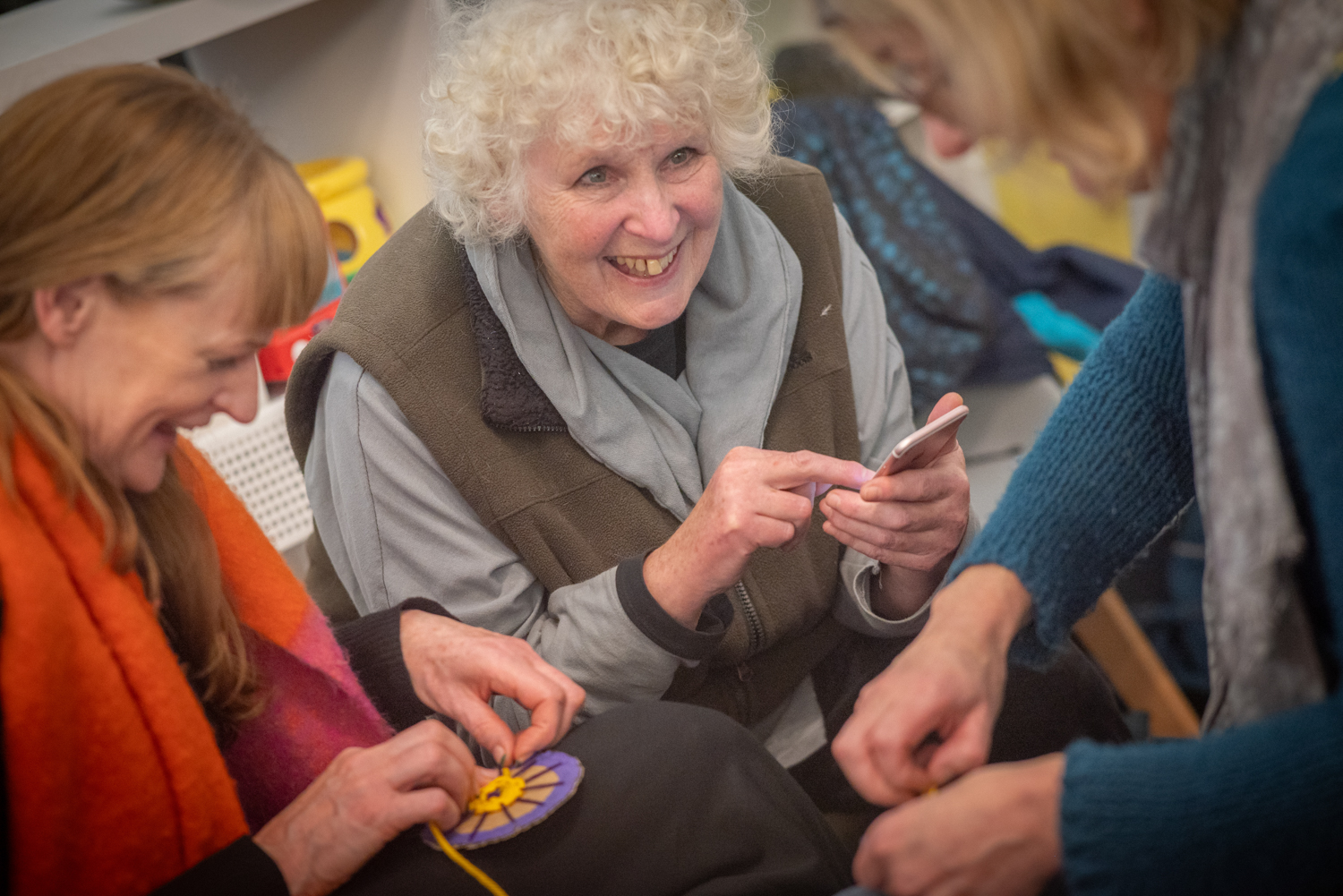
Photo credit: Luke Galloway
Rather than think about relationships as something that can help us do a thing, we’re thinking what things can help us build relationships
Make/Shift is an initiative focused on bringing creativity into everyday life. It’s still at an early stage, asking questions and finding its place. ‘We’re still figuring out who we need to be to add the most value,’ says Rachel. ‘So we’re literally just meeting a lot of people, having a lot of conversations, building relationships.’
The Make/Shift team spend a day a week in a community centre, listening and getting to know people. This way of working ‘requires a lot of faith and trust,’ Rachel says. ‘Instead of focusing on outputs and projects, we’re saying If we behave like this, something good will come out of that. Right now, it’s so uncomfortable that we’re not able to talk about a thing.’
This uncertainty can be off-putting. Many new organisations rush through the phase of listening and building relationships because it is too uncomfortably indeterminate.
Make/Shift’s investigations so far have involved uncovering what’s already happening in local communities and mapping the relationships between those different people and projects. This process has revealed that there’s a need for something to join up existing efforts and help people ‘see and value what’s already there’. As such, ‘rather than creating new things’, Make/Shift is focusing on ‘connecting the things that are there.’
Make/Shift use making and creativity to forge these connections. ‘Making together is a tool that brings people together and gets them talking,’ Rachel says. ‘Busy hands, loose mouths. If you’re doing something practical, conversations can happen differently.’
They host monthly socials where they invite different groups to come together.
There’s permission to build relationships without the session being intensely focused on relationships. The main focus is making a thing and that distracts people and helps them lower their guard. The first session brought together leads from different mental health charities. Very quickly they were into some very deep chats. There wasn’t an agenda. They were just sat down twiddling with clay; they weren’t even looking at each other.
The challenge, Rachel admits, is asking people from busy services and organisations to come together for an open-ended session. ‘Some people haven’t come,’ she says, ‘and just said they’re too busy.’
But when they do, powerful things can happen. ‘When the pressure’s off, the conversation can be what it needs to be,’ Rachel says. ‘There’s no sense that at the end of the conversation there has to be a set of outcomes. But sometimes it leads to exciting outcomes anyway and then people have follow-up meetings and new connections get made.’
Reflection questions
Digging deeper
- What difference are relationships making in these community groups? How might this be understood and articulated?
- What role did the practical activities (making, litter picking etc) play within the relational work here?
- What value might introverted leadership bring to relational ways of working?
Applying the learning
- What could your organisation or community learn from the emergent relational practice in these stories?
- Where and how might you create this kind of open-ended space in your context?
More stories
The Relationships Map
The Relationships Map is a space for anyone who believes in the importance of relationships to find one another, share ideas and resources, feel part of something bigger, and realise more than the sum of our parts.

